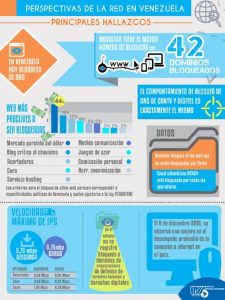EspañolIn Venezuela, at least 372 web portals have been blocked by main Internet service providers (ISP). Also, 43 Internet domains have been blocked by these same providers, both public and private.
Of those, 44 percent are web pages related to black market dollars. An additional 19 percent of the pages are news media and an additional 12 percent feature blogs critical of Nicolás Maduro’s administration.
These findings are the product of a new study called “Navegar con Libertad” (or, Browsing with Freedom) conducted by the Institute for Press and Society (IPYS) of Venezuela. The study evaluated web behavior in the country between November 2015 and January 2016. The study included evaluations of access speed tests, blocking tests and of fundamental guarantees over freedom of speech on the Internet.
The most famous of the blocked web pages is that of NTN 24, a Colombian news channel. The page was blocked by Cantv, the main, government-controlled ISP. The page is also blocked by Movistar, Digitel, Inter and Supercable.
The study states Cantv and Digitel have similar blocks placed on them, in that they both block exactly the same web pages. However, Movistar censors sites that Cantv hasn’t blocked.
In general blocks are imposed by an oversight agency, the National Council for Telecommunications. They have done this using the Statute of Social Responsibility in Radio, Television and Electronic Media. This law has been considered, since its approval in 2004 (and its extension to Internet in 2009) as a censorship mechanism. Forty-two pages are being simultaneously blocked by all large Venezuelan Internet Service Providers, due to demands of Nicolas Maduro’s administration.

“Criteria for blocking websites seem to correspond to Venezuelan political specificity,” an IPYS official said. However, the study made clear it didn’t observe “any other Internet censorship mechanisms (besides DNS blocking). There have been no IP-based blocks, content based or key words blocks, nor any other content alteration.
Stronger since 2013
The web page blocking policy worsened since Nicolas Maduro came to power in April 2013, the report points. It peaked in 2014, when he demanded ISPs to start blocking pages that were giving information on black market dollar. That same year, the Venezuelan government demanded Twitter to block accounts from those pages. It also blocked the URLS shortener bit.ly (this one is already back in service in Venezuela).
NTN24, meanwhile, has found ways for their pages to appear in Venezuela anyway, using the domain webNTN24.us. The news chain was blocked from cable channels last February 12, 2014 during Caracas protests in which people protested against Maduro’s adminstration and the jailing of opposition leader Leopoldo Lopez. Around 500 sites were blocked by the government during the event, creating a peak that slowly subsided.
Cantv and its subsidiary Movilnet reportedlty manipulated data speed for Twitter and Youtube servers to avoid leaks on the protests.
In November 2014, the portal infobae was blocked by four of the main ISPs in the country. Today, it is blocked intermittently, and is often only accessible through social media or access breaches. By its nature, Internet is hard to block entirely. But since 2010, the Venezuelan government has been promoting a “unique access point” through Cantv, which is considered a censorship attempt by most freedom of speech NGOs.
IPYS mentioned the “blackout” suffered by social media in the last two hours in the voting booths during the 2013 presidential elections, which was won by a very tight margin (1.49 percent) by Maduro. Frequently, sources have said that during this “blackout,” voting was manipulated to reverse an unfavorable margin of the ruling party when faced by opposition candidate Henrique Capriles. However, such arguments haven’t been proved nor shared by Capriles himself.
Nine years of failures
IPYS Communications Expert Iria Puyosa said 2008 marked the reversal of the official party’s policies on internet access. This happened a year after the Cantv nationalization, which was in the hands of a Hispano-American consortium up to that point.
In the period between 2007 and 2015, Internet connectivity reached “minimal levels,” according to Puyosa. She also said “regulation on contents increased.
The Cantv nationalization has brought a divestment in Internet infrastructure, which is used by 61 percent of the country. There is a regional breach: regional centers, dependent on private economy are very connected. The rural population, dependent on the public sector, is very disconnected, according to a report published by Puyosa in 2012. This trend has worsened four years later.
Internet speed is a meager 2.31 Megabits per second (Mbps), compared to the regional average of 7.26 for the rest of Latin America. According to the report, this makes Venezuela the country with the slowest Internet in the entire region.
Government officials don’t seem to mind. On the contrary, the newly appointed head of Movilnet Jacqueline Farias dismissed the statistic. She said last week in Venezuela “Internet was slow because it’s so cheap, that’s why many people use it. In other countries it’s fast because it’s so expensive and used by so few people.”
Of course, this argument doesn’t stand up against the slightest analysis. This week alone, the company she represents raised its Internet rates up by 1000 percent. The best plan will come to cost VEB $7,000 a month. Though cheap in dollars (just USD $7), it’s around half the average monthly minimum wage in Venezuela.
a pagar 6 mil por un servicio que no sirve , CANTV ABA , otro logro revolucionario
— julio Cesar moran (@juliobailouni) July 16, 2016
julio Cesar moran @juliobailouni
Get ready to start paying 6 thousand for a useless service. CANTV ABA, another revolutionary achievement.
 Versión Español
Versión Español












